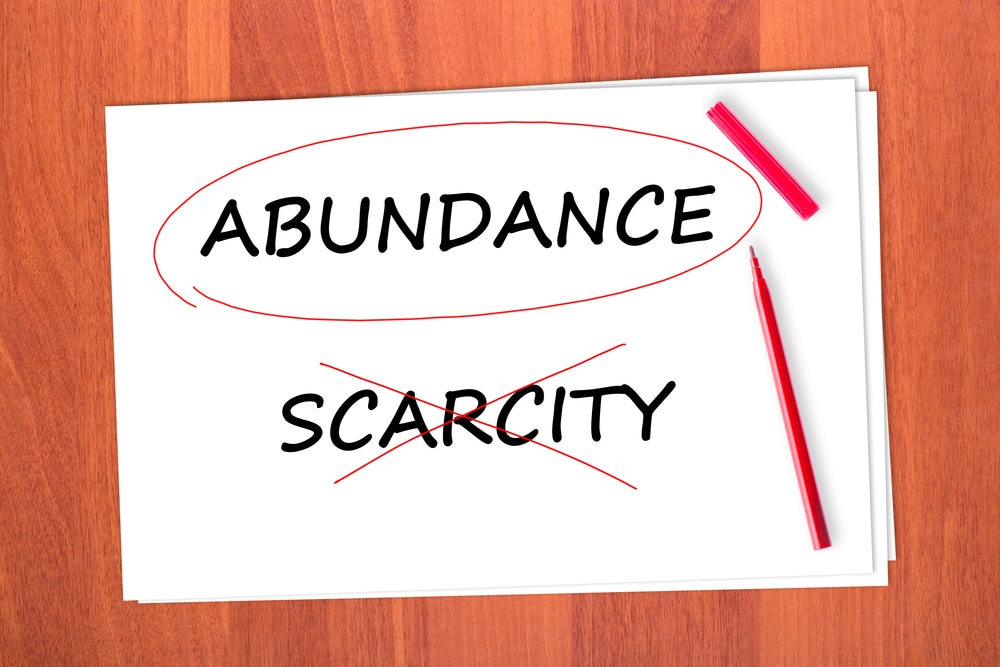Many of us are wondering how best to tend to our mental health whist we are hunkering down, waiting for the global, category five hurricane to pass. Aside from adhering to personal hygiene and social distancing protocols, there is little more we can do to curb spread of COVID-19. Virulent panic, however, is a different story. In this article we will explore fear’s true purpose, the problems we are likely to encounter when we become overly attentive to fear (i.e., panic), and what we can do to step out of fear once it has fulfilled its purpose. Healthy fear is meant to wake us from denial and get us to take action. Without fear, it is likely we would still be rubbing dirty hands all over our faces and gathering in public spaces. When we listen to fear and respond accordingly, fear has done its job. After that, the healthiest thing to do is let it go. Continuing to ruminate about things beyond our control is a one-way ticket to panic which, like fear, also has a specific purpose. Eons ago, it was panic that alerted us to clear and imminent danger. It prompted us to run, fight, or flee to avoid being eaten by predators or killed off by neighboring tribes. Today, panic is helpful in so far as it protects us from danger that is happening in the present moment: the smoke alarm sounds and we quickly exit the building. Beyond that, panic is pretty much useless. In states of prolonged stress, the brain can get stuck in panic mode. When the smoke alarm routinely sounds, it becomes difficult to distinguish a false alarm from a real fire. What’s more, primal fear can manifest as a state of impending doom, about which we must do something, even when there is nothing more to do. In panic mode, our thoughts and actions will organize themselves around two themes: life (i.e, food, sex, and toileting) and death. Additionally, primal fear incites irrational competitiveness. Plentiful goods (read: toilet paper) suddenly appear to be in short supply. So we overbuy, all but guaranteeing the very scarcity we fear most. I suspect this to be the reason that supermarket shelves are empty. We are worried there will not be enough for everyone so we make sure there isn’t enough for anyone. Sound smart to you? Me neither. Like most primitive instincts, panic is neither discerning nor sophisticated. Okay. Now we know about panic and the understandable (but not so helpful) compulsive behaviors that come with it. It’s time to talk about what we can do to turn off the panic switch. Here are a few things to try:
Remember pandemics are both temporary and survivable. While it true (and sad) that some will not outlive COVID-19, it is also true that the vast majority of us will. The pandemic will end eventually. When it does, just as our foremothers and fathers did in 1919, we too will rebuild. In the meantime, we must choose wisely when and how we engage with fear. If you are following personal hygiene and social distancing guidelines, then fear has already served its purpose. It’s okay to let it go. Dr. Jill Gross is a licensed psychologist, therapist, and counselor. She offers grief therapy, divorce consultation, co-parenting support, and other counseling services in the Phinney Greenwood area of Seattle, WA. Stuck in panic mode? Schedule a free phone consultation to find out how counseling can help you go from panic to peace.
0 Comments
The loss of a spouse or soul mate can generate so many questions. In the acute fog of grief, each moment is its own unique world--changing all the time. We wonder about the basics of survival. How will we get through each day? Will we ever feel 'normal' again? As time passes, the content of our questions shifts toward a greater curiosity about what the future holds. We ask who will hold us again or how we will know the time is right to accept new love into our hearts. What follows is a letter from one reader who, five years after losing her beloved soul mate, is grappling with some of these questions and the feelings that go with them. I hope this letter can be of use to any of you who may be wrestling with how to move forward after losing a spouse or partner. Feel free to share your sentiments and questions in the comments section below. I look forward to hearing from you! Dear Dr. Jill, My husband of twenty-five, amazing, fun-filled years died suddenly of an aneurism about five years ago. I’m not exaggerating when I say John was everything to me. He was my lover, my best friend, my traveling companion. We had two beautiful children. We were inseparable. When John died, my life came to a screeching halt. I can barely remember the first year or two after my soul mate's death. There were days when I couldn’t get out of bed or see anyone. I had trouble eating, showering—even parenting my then teenaged children. There were times when the pain was so bad I thought it would kill me. And there were moments when I actually wanted it to, just so John and I could be together. With the support of my family, friends, and church, I slowly crawled out of the dark hole I was in. I started eating, showering, attending church services, and reengaging with my friends and family. Life is still hard without John but I’m managing as well as can be expected. About six months ago, a fellow church member (I’ll call him Chuck) started asking me to do things. A dinner here. A movie there. I’ve known Chuck since before John died, so I assumed he was just being friendly. However, a few weeks ago, Chuck told me he was interested in something more than friendship. At first, I panicked and told him I was not ready to date. I made a few awkward jokes and then quickly changed the subject. I figured all would return to normal and that would be that. Since that night, I cannot stop thinking about Chuck. Each time I do, I instantly think about John and then I feel guilty. I try to push the thoughts about Chuck out of my head. I haven’t been able to do it. It’s been five years since his death and, yet, I feel like I'm being disloyal to John. I’m worried that my children and my church community will judge me if I start dating again. And what if things don’t work out with Chuck? What then? I’ve relied so heavily upon my church since John died, I’m afraid that a relationship with Chuck might jeopardize my place in the community I've come to rely on. I’m so confused. If I have all of these questions, does that mean that I’m not ready to date? Or does it mean that Chuck is not the right person to date? I was with John for so long and things were so easy. I am not sure I know what is normal and what is a sign that I’m making a bad choice. Any advice you have is appreciated. Signed, When To Say When Dear When, If my arms were long enough, I would reach out and hug you right now! The depth of your love and commitment to John came through in your words. I can only imagine how difficult it was for you to learn how to move forward without him. What also came through in your letter was the transformative power of grief. Though it wasn’t easy, after the initial “grief fog” lifted, you leaned into your support system and created a new normal for yourself. This takes courage and tenacity. Thus, it’s no surprise that any man would feel drawn to your strength! The questions you are asking suggest the presence of both fear and its most reliable sidekick, self-doubt. These feelings make sense. The last time your heart was open, it was devastated by loss. Of course you would feel unnerved as the door to your heart slowly creaks open again. Fear, self-doubt, and romantic attraction do not have to spell disaster or disloyalty. They can instead signify the awakening of parts of yourself that have been dormant since John’s death. Aliveness, in whatever form it presents itself, is always a good thing! It is not necessary (nor is it possible) to know how things will turn out with Chuck. In fact, the outcome may matter less than you think. What's more important is the conscious choice to turn toward your own vitality. When granted permission to do so, the heart will naturally make space for more love. John will always be a unique and integral chapter of your love story. Neither his death nor your choice to seek joy with a new partner will change or undo that. In closing, I would like answer your questions with two of my own: What if there were no mistakes? What your grief gave you everything you need to handle this situation? Proceeding as if both of these things are true will go a long way toward figuring out the next best step. Good luck! Yours In Health, Dr. Jill Dr. Jill Gross is a licensed psychologist and grief counselor in the Phinney - Greenwood area of North Seattle. If you are struggling with the death of a spouse, help is just a click away. Schedule a free consultation to see how grief therapy can help you rediscover your own aliveness! Money. It's a loaded topic. So loaded that it happens to be one of the three most common things couples fight about. Sex and children are the other two. Just in case you were wondering.
Last week, a reader asked for help with compulsive spending behavior. Since this issue is actually quite common, I am posting both the letter and the response here on the blog. If you've got thoughts on this subject, feel free to share them in the comments section below. Dear Dr. Jill, I have a little spending problem. Actually, if I’m really being honest, the problem is more than little. I seem to have a penchant for maxing out credit cards. I maxed out three credit cards in ten years. Whenever I saw something I wanted, I was pretty good at convincing myself I *had* to have it, even though, deep down, I knew I really couldn’t afford it. After making a purchase, I would feel good for a while. But then the bills I couldn't pay would show up at the end of the month and I would end up feeling guilty. I was hopeful for change when, three years ago, I met and got engaged to a really wonderful man. When my fiancé and I met, he had a good job. He was really good with money (he had no debt because he preferred to pay cash for everything). In an effort to start our financial lives off with a clean slate, my fiancé agreed to pay off my debt. I thought my problems were solved! We shredded all of my credit cards too. I felt scared about the idea of not having any credit cards but I also felt free. My fiancé put us both on a budget that I promised to stay within. This seemed to work for a while. A few months ago, I received a credit card offer in the mail. I knew it was a bad idea but I went for it anyway. Here’s the worst part: I didn’t tell my fiancé. I can’t say for certain why I didn’t tell him. I guess I thought I could handle it on my own. I was wrong. I told myself I would use the card only for emergencies. But, a few weeks into it, I started making purchases. A pair of winter boots here, a new sweater there and so on. I told myself I would take care of it by the end of the month but, when the bill came, the balance was more than we had in our checking account! Afraid that my fiancé would find out, I shredded the statement and told myself I would take care of it next month. That was almost two months ago and I still haven’t done anything. The wedding date is now three months away and we will soon be required to make the final deposits for the caterer, venue, etc. If we pay off my new credit card, we won’t have the money to pay the vendors for our wedding. I’m scared to tell my fiancé what happened. I’m afraid he will be mad or, worse yet, end our relationship. He is really the best thing that has ever happened to me. I don’t want to screw this up. Can you help me figure out what to do? Signed, Secret Spender Dear Secret Spender, I am relieved that your secret has finally been given a voice! Engagements and weddings can bring up a lot of complicated feelings. I’ve yet to meet anyone (well--anyone who is being totally honest!) who hasn’t had at least some fear or self-doubt prior to getting married. “How will marriage affect my independence?” and “What if the relationship doesn’t work out?” are two of the most common questions asked by the betrothed. Perhaps the recent bout of spending is your way of grappling with these questions, without addressing them directly. Compulsive behaviors, such as drinking or spending money, are often used to help mitigate painful or difficult emotions, like fear or self-doubt. The only trouble is, by engaging in compulsive behaviors, we end up creating more of the feelings we were hoping to assuage in the first place! In other words, you are now quaking in the very boots that were originally meant to keep some of your fears at bay. When we choose to make something a secret, we give it power. It’s possible the latest transgression may be inviting you to reclaim this power, first by telling your fiancé exactly what happened. It is better your partner hear it from you than a disgruntled wedding vendor or agent seeking to resolve a debt he is completely unaware of. Regardless of what your partner chooses to do with the new information, you will have taken a bold, brave step toward reestablishing trust in the relationship. Assuming you both choose to proceed with the relationship, you and your partner, as a united team, can make informed decisions about how to meet your impending financial obligations. Another way to empower yourself is by seeking therapy with a qualified addiction specialist. A professional of this nature will have the skill set needed to help you learn constructive new ways of managing discomfort while protecting yourself and the relationships you treasure. Organizations like Debtors Anonymous are also great places to get support from like-minded individuals. Compulsive spending is treatable but it can also be tenacious. So I urge you to consider getting the support you deserve and committing to it for the long haul. You’ve made an important first step by sharing your secret with this community. I encourage you to keep the conversation going, both with your partner and with a good therapist. Thank you for writing in! Yours In Health, Dr. Jill Dr. Jill Gross is a licensed psychologist, therapist, and counselor. She offers grief therapy, divorce support, and other counseling services in the Phinney Greenwood area of Seattle, WA.
People seek counseling or therapy to change what no longer works: careers, lifestyles, friendships, marriages. They’ve labored for months, years, sometimes even decades to make their jobs more appealing, their spouses more affectionate, their families more considerate. Exhausted from the fight, clients come to therapy hoping their therapist or counselor will join the effort. And we do. Just not always in ways our clients expect.
What brings people in the door is frequently not what keeps them there. What is initially described as a problem is usually the beginning of a solution. Jason*, a twenty-three-year-old, second-year medical student, was referred for psychotherapy by a psychiatrist from whom he originally sought antidepressant medication. He didn’t exactly sit on my sofa. He slammed himself against the back cushion and slid, pancake-style, until he was practically laying down and sitting up at the same time. When asked what brought him to therapy, he could barely lift his head to answer. “Depression” was the most he could muster. I probed further. From the time he was old enough to walk, talk, and cut his own steak, Jason was told he was destined to be a physician. For the entirety of his youth, his parents, both surgeons, conveyed to Jason that he had two post-college options: medical school or medical school. Jason was a gifted student to whom science and math came easily. So, after graduating from a prestigious college with a Bachelor’s degree in biology, Jason applied to medical school and was accepted. Off he went. There was only one tiny problem with this plan: Jason hated medicine. A classically-trained pianist, his true love was music. He wanted to play professionally. Because Jason knew his parents would never approve of this choice, he buried his love of music and forged ahead with the mandate to become a doctor. Though Jason’s presenting concern was depression, with time, it became clear that depression was merely a topical symptom: the real issue was Jason’s relationship with approval. He needed approval so desperately he was willing to pay for it with his life--literally. As he whiled the hours becoming more of the person his parents wanted him to be, he was slowly becoming less and less himself. By the time I saw him, he was merely a shell, his own narrative virtually indistinguishable from that of his parents. It was a long and difficult road but Jason eventually found his voice. As he did, the depression lifted. He mustered the courage to put his medical studies on hold and pursue music. His parents weren’t thrilled but, to his surprise, they hung in there. What’s more, Jason decided, on his own, that he would move in with roommates to lower his living expenses and support himself by teaching piano lessons. It wasn’t a king’s ransom but it was a living. At twenty-three, Jason was doing the unthinkable: he was becoming an adult. Jason clung to a medical career to protect both himself and his parents from the dilemma of having to choose their real-live son over their idealized version of him. The most difficult part of Jason’s journey was not abandoning a career he never wanted to begin with, but trusting that he was strong enough to withstand the discomfort of telling an authentic but unpopular truth. In so doing, he untethered himself from the core belief that his well being was contingent upon the approval of those he cared about. With the need for external validation no longer powering the engine, Jason was not only surviving; he was actually thriving! Jason’s story is not unique. For many of us, fear manifests as immutable obstacles we tell ourselves we cannot live with or without. We cannot leave the job that is giving us bleeding ulcers because we need the money. We cannot ask for what we want because our spouses will leave us. We couldn't possibly sell the house that is bankrupting us. Over and over, we plead with life to change in one breath while weaving stories that are designed to keep it the same in the other. It is not the obstacles themselves that keep us stuck, it is our relationship with the meaning we have imbued those obstacles with. Most obstacles serve a protective function. They shield us from our deepest fears and the dependencies that maintain them. They keep us at a healthy distance from what we are not yet ready to know or experience. We struggle to find a way out of suffering not because we don't have answers but because we haven't yet found the right questions. Had Jason and I focused solely on eradicating his depression, we would not have seen that the real issue was a dependency that was preventing him from knowing his own strength. We cannot succeed at removing the barriers to change unless we first understand and acknowledge their benevolent purpose. If you're on the cusp of making an important change and something appears to be holding you back, remember that you have chosen this obstacle for a reason. Try not to blame yourself here--there is no sense in heaping suffering on top of pain. Reminding yourself that you are the architect of your obstacles can be a way of offering hope that, when you are ready, you will draw up a different blueprint! How have you overcome obstacles in your life? Tell us about it in the comments section below. *Names and identifying information have been altered to protect patient confidentiality. Dr. Jill Gross is a licensed psychologist, therapist, and counselor. She offers grief therapy, divorce support, and other counseling services in the Phinney Greenwood area of Seattle, WA. Are obstacles getting in the way of you having the life you deserve?
A friend and I were chatting the other day about relationships. After a season of self-prescribed abstinence from the online dating community, this friend (a bright, vibrant forty-something) decided to jump back in the game.
My comrade had recently met an attractive individual with similar interests, goals, and values. She had assumed, were this to happen, that she would be awash with positive emotion. She assumed incorrectly. Instead of bunnies, rainbows, and Oprah moments, my dear friend was wracking her brain for the myriad of ways something could go wrong in the relationship. Perhaps her date would see aspects of her life that are still under construction. Perhaps her affection for this prospective partner would be unreciprocated. Perhaps the whole thing would crash to the earth in a magnificent fireball. In other words, the very thing my friend thought would fulfill her was now the source of considerable discomfort. My friend’s experience is actually quite common. On the verge of accomplishing our goals, it is common for many of us to feel restless or agitated. Why does this happen? The answer is somewhat complex. Longing is an unconscious manifestation of scarcity, the pervasive belief that we are not enough and/or that we do not have enough. Scarcity is fueled by fear and self-doubt. These feelings come with a dialogue that usually begins with “what if” and ends in loss or catastrophe. These stories can feel so real sometimes, we start responding to them as if they are true. They are not. They are merely representations of emotions that are meant to come and go. When we are anxious or fearful, our bodies and brains are compelled to seek—sometimes obsessively—for the people, places, or things we think will deliver us from scarcity. We are seduced by the notion that the perfect partner, job, house, will be our one-way ticket out of painful feelings. The greater our fear, the more urgently we seek to quell it. The wiser mind knows this is a fool’s errand, but fear is an irresistible salesman. Seduced by the idea that deliverance is just one person, place, or thing away, we become consumed by thoughts of the future. In so doing, lose touch with what we are feeling in the present moment. I like to call this “the seeking trance.” When we find what we are looking for, the trance is broken, our love affair with “someday” abruptly ends, we are catapulted into the present moment, and the feelings we were attempting to avoid come rushing into consciousness. Suddenly, the object of our craving becomes someone or something we don’t trust. Online dating can be a sticky wicket for precisely this reason. Each profile is carefully crafted by an individual who has his or her own unique relationship with fear and scarcity. The result is a collective mass of fear-based energy that manifests in unanswered messages by individuals who proclaimed interest, promising first dates who mysteriously disappear, salacious electronic threads that never yield an in-person meeting. (Sidebar: no wonder my friend was feeling overwhelmed by fear—online dating is a veritable roller coaster of hope and disappointment!) The next time you sense urgency in the absence emergency, this is a cue to pause and inquire. Ask yourself what you are afraid of. When we give a voice to fear, we deflate its power. Name your fear(s) out loud. If a child experiencing the same fear approached you for reassurance, how would you respond? Would you judge or criticize this child or would you surround him or her with loving grace? I suspect you would do the latter, so offer this gift to yourself. Repeat this process as often as needed. Remember that fear and desire are opposite sides of the same continuum. To move from one end, we must lovingly attend to the other. When we really listen to our fear, when we respond to self-doubt with loving kindness, we inch closer to desire. Just as fear begets scarcity, desire beget abundance. When we act from a fearful place, our energetic field constricts, practically guaranteeing we will not find what we are seeking. When we act from a place of authentic desire, we make room for the things want to find us and, when they do, we are more likely to value them. Dr. Jill Gross is a licensed psychologist, therapist, and counselor. She offers grief therapy, divorce support, dating consultation and other counseling services in the Phinney Greenwood area of Seattle, WA. Want to have a richer, more satisfying online dating experience? Schedule a free consultation now! |
AuthorDr. Jill Gross is a licensed psychologist, specializing in grief and divorce. Her coaching and therapy practice is located in the Phinney - Greenwood area of North Seattle in Washington. Archives
May 2021
Categories
All
|
HoursM-TH: 8:30 AM - 2:00 PM.
By Appointment Only |
Telephone & Email |
Address503 N. 50th Street
Seattle, WA 98103 |
*Header Photographs courtesy of Josh Martin







